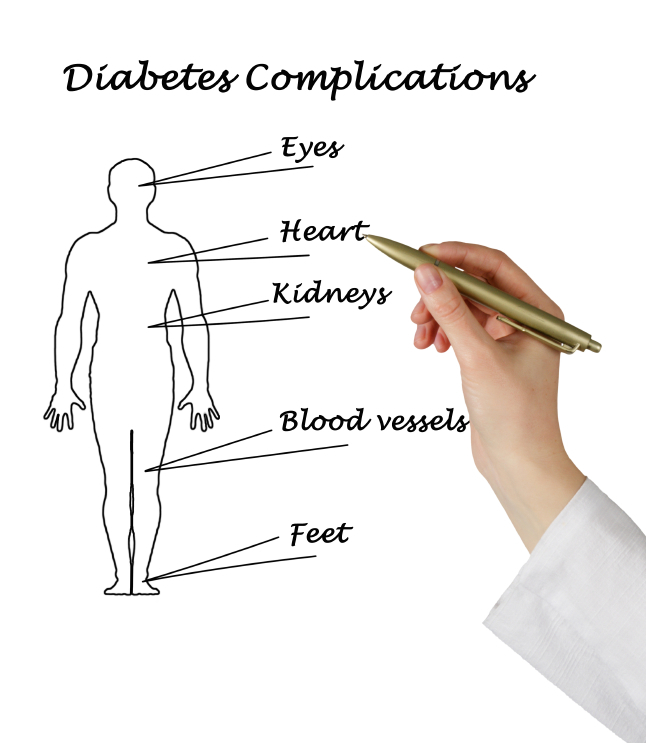Diabetes Complications

There are many potential and real complications that can result from diabetes. Every person with diabetes or who is at risk of diabetes should be screened or treated by the appropriate specialist.
In addition to managing blood glucose through medical and lifestyle measures and receiving appropriate screening and treatment for diabetes complications from specialists, the person with diabetes should be tested for nutritional deficiencies and take the appropriate pharmaceutical-grade nutritional supplements that can decrease the chance of developing these complications. Unfortunately, conventional screening techniques can often miss early cases of complications, making it ever so important to take these preventive and therapeutic measures. Current kidney-disease screening techniques for people with type 2 diabetes, miss 30% of the cases. Conventional healthcare has not been effective with using nutritional support for preventive measures of diabetes and its complications, which is so sad since it could prevent pain and suffering and improve prognosis. Emphasis on diet & nutrition is the Number 1 priority for treating and preventing diabetes here at VITAL Health Solutions.
Blindness: Each year, up to 24,000 people lose their sight due to diabetes. Having diabetes, increases risk of blindness by 25 times. Diabetes Retinopathy & Macular Degeneration are the most common causes of blindness related to diabetes and can be slowed down by not only good glycemic control, but also with the appropriate diet and nutritional supplementation.
Renal (kidney) Disease (nephropathy):
- 80,000 individuals are diagnosed with renal failure per year in the U.S.
- Diabetes is the most common cause of kidney failure. Approximately 40% to 50% of new cases of renal disease are due to diabetes.
- Approximately 21% of patients with diabetes will develop kidney disease.
- Approximately 100,000 people have kidney failure as a result of diabetes.
- Approximately 40% of people with type 1 diabetes develop nephropathy and renal failure by age 50. Some develop prior to 30 yeas of age.
- At least 5-20% of non-insulin dependent patients with diabetes have renal disease 20 years after diagnosis.
Neuropathy: 50% of people with neuropathy will have no symptoms until it's too late
Peripheral Neuropathy: damage of nerves to the periphery (feet and hands). Tingling in the arms and legs may be an early sign of nerve damage. These feelings usually start in the toes and feet (these are the furthest body parts from your heart and since circulation is compromised due to the diabetes condition, they are the first to suffer). One of the first findings of diabetic neuropathy that your healthcare provider may notice, is loss of vibratory sense. We don't know why this occurs, but we do know it occurs in the second or third digits of the lower extremities, of one or both feet. Is your healthcare provider testing your vibratory sensation with the appropriate tool? This is a routine testing at DiabeteSteps Rx®.
Deep pain or burning may also occur, especially in the feet and legs. Feeling may be lost and therefore, you are unable to recognize when you step on a sharp object or touch something that is too hot or cold. The nerve damage may also may make it more difficult to control muscles and may lead to weakness. Risk of falls increases due to the legs buckling and/or tripping over your own feet. This is the FIRST step in the "Stairway to Amputation." Find out here how to prevent further progression and reduce risk of foot ulcers and amputations in "Standing on Your Own Two Feet with Diabetes: Reducing Your Risk for Foot Ulcers & Amputations."
Autonomic Neuropathy: damage to the nerves not under conscious control
- Cardiovascular Effects: hypotension and ischemic
- Sexual Effects: impotence/erectile dysfunction
- Gastrointestinal Effects: nausea, esophagitis, diarrhea or constipation, gastroparesis (affects 25%), bloating
More Coming Soon

